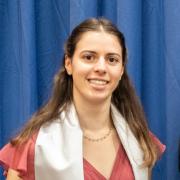Status
Scientific disciplines
Research direction
Catalysis, Biocatalysis and Separation
Affiliate site
Lyon
Zeolites are nanoporous materials with well-defined crystalline structures, considered key assets in the on-going transition from fossil to renewable fuels and chemicals.[1] In particular, zeolites are efficient catalysts for the transformation of bio-sourced alcohols. Predicting the reaction rates of the dehydration of alcohols into alkenes is crucial to go beyond a trial-and-error approach, in the quest for innovative catalysts. The preferred dehydration mechanisms of butanols are strongly questioned.[2] Moreover, with zeolites of intermediate pore sizes, the specific reactivity of the external surface (at the border of the crystallites, versus internal surface at the nanopores) is also questioned. In the present work, we propose to (i) unravel the mechanism of the dehydration of butanols into butenes in zeolites thanks to advanced quantum chemistry calculations (ab initio molecular dynamics), (ii) while taking into account the effect of the external surface of zeolite crystallites, whereas the reactivity of the bulk nanopores only are usually considered, (iii) making use of most advanced machine learning (ML) simulation techniques (for example, ML forcefields and ML perturbation theory[3, 4]), so as to quickly get data with unequalled accuracy. The ultimate goal is to build a predictive kinetic model. The thesis is part of the MAMABIO project (Machine Learning methodologies for accelerated and predictive atomic scale simulations of the transformation of biosourced molecules) within the B-BEST PEPR, offering an optimal collaboration network: partners developing ML methods and performing experiments to be compared with the simulations will be associated.
[1] C. Chizallet, C. Bouchy, K. Larmier, G. Pirngruber, Chem. Rev., 2023, 123, 6107
[2] M. Gešvandtnerová, T. Bučko, P. Raybaud, C. Chizallet, J. Catal., 2022, 413, 786
[3] B. Chehaibou, M. Badawi, T. Bucko, T. Bazhirov, D. Rocca, J. Chem. Theory Comput., 2019, 15, 6333
[4] J. Rey, C. Chizallet, D. Rocca, T. Bučko, M. Badawi, Angew. Chem., Int. Ed., 2024, e202312392
Keywords: density functional theory, molecular dynamics, reactivity
- Academic and IFPEN supervisor Dr. HDR. Céline CHIZALLET, ORCID : 0000-0001-5140-8397
- Doctoral School ED206, Ecole Doctorale de Chimie de Lyon, Université de Lyon
- Academic and IFPEN collaborators Dr. Thomas PIGEON (IFPEN), Prof. Michael BADAWI (Université de Lorraine), Dr. Ing. Tomas BUCKO (Comenius University in Bratislava)
- PhD location IFPEN, Lyon, France, possible short stays in Metz and Bratislava
- Duration and start date 3 years, starting in the fourth quarter 2024 (November 4)
- Employer IFPEN
- Academic requirements Master degree in Physical, Theoretical or Solid state Chemistry, or Catalysis
- Language requirements English (at least B2 level, in the European language level), possibly French
- Other requirements Basic knowledge of quantum chemistry and strong interest for the simulation of chemical reactivity will be appreciated.
To apply, please send your cover letter and CV to the IFPEN supervisor indicated below.
